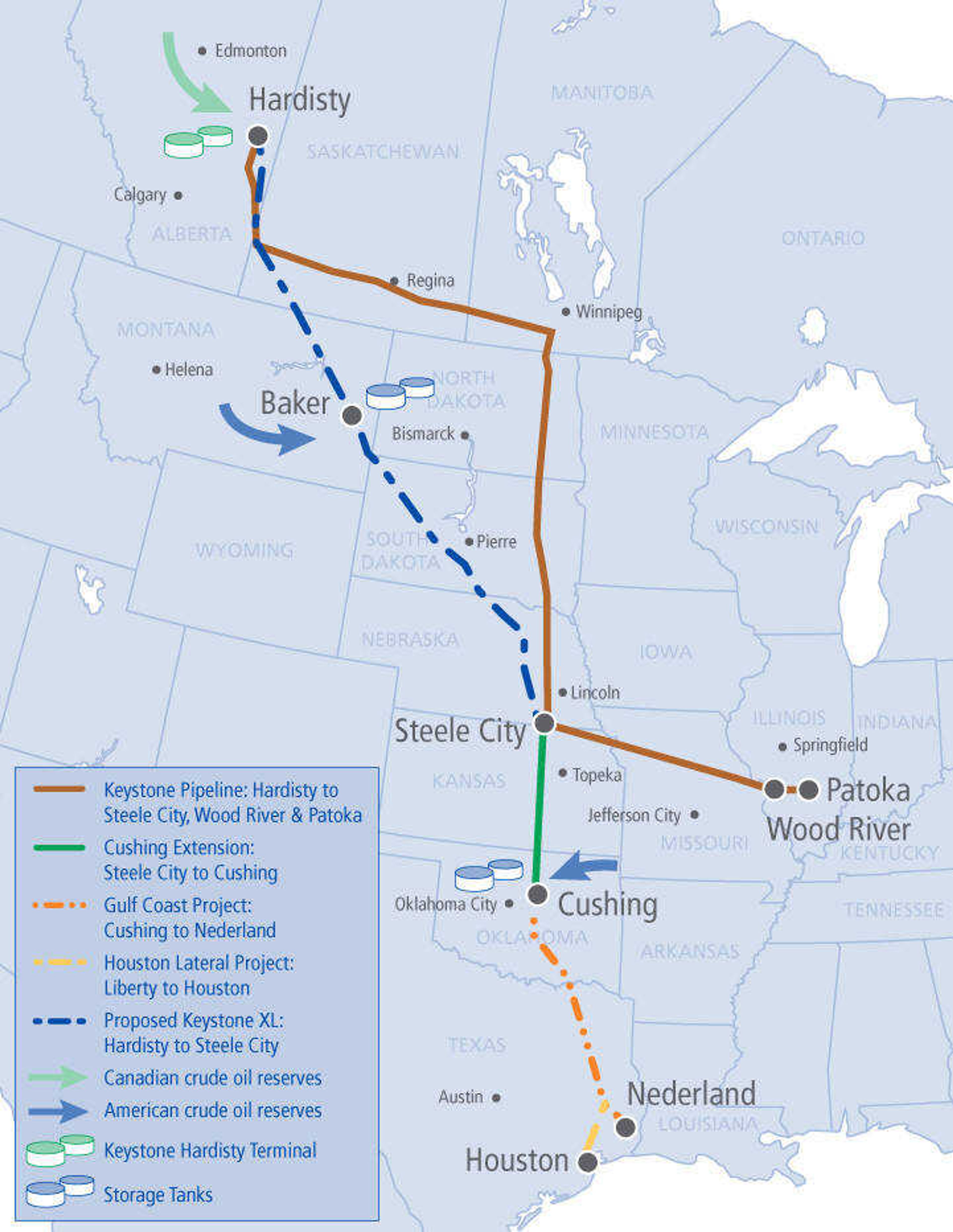Kinder, 21 other lieutenant governors urge approval of pipeline
Lt. Gov. Peter Kinder joined 21 other lieutenant governors in urging President Barack Obama and Secretary of State John Kerry to approve TransCanada Corp.'s Keystone XL Pipeline project, citing economic benefits to Missouri from the crude oil transport system from Canada through the Midwest. Opponents say the pipeline could cost Missouri consumers more at the pump and hurt drinking water...
Lt. Gov. Peter Kinder joined 21 other lieutenant governors in urging President Barack Obama and Secretary of State John Kerry to approve TransCanada Corp.'s Keystone XL Pipeline project, citing economic benefits to Missouri from the crude oil transport system from Canada through the Midwest. Opponents say the pipeline could cost Missouri consumers more at the pump and hurt drinking water.
"On behalf of Missourians who will benefit from the Keystone XL Pipeline, we urge the president to stop standing in the way of good-paying jobs for hardworking Americans," Kinder on Monday said in a news release. "It's time to build this pipeline."
Kinder's recommendation came from his meeting two weeks ago with the Republican Lieutenant Governors Association, said Kinder spokesman Jay Eastlick. Increased U.S. energy independence was cited as a reason Kinder supported the project.
The project is an extension of the original Keystone Pipeline, energy company TransCanada's 2,150-mile pipeline that transports crude oil from Alberta, Canada, to Steele City, Neb., then splits into two arms -- one that goes south to Cushing, Okla., and another that is routed through Missouri to two refineries in Illinois. Deliveries of crude oil to Illinois began in summer 2010, and deliveries to Cushing began in February 2011.
The Keystone XL Pipeline Project is a proposed 1,179-mile, 36-inch-diameter crude oil pipeline that also will begin in Alberta and extend along a different route to Steele City. Future phases eventually will connect it to the Gulf Coast.
"Along with transporting crude oil from Canada, the Keystone XL Pipeline also will support the significant growth of crude oil production in the United States from producers in the Bakken region of Montana and North Dakota," according to the TransCanada website. "This pipeline will allow Canadian and American oil producers more access to the large refining markets found in the American Midwest and along the U.S. Gulf Coast."
Opponents say the pipeline will benefit the oil industry but consumers stand to lose. The transport system is a way for energy interests to become connected to the world market, instead of selling the unrefined "tar sands oil" it carries -- heavy crude oil mixed with sand, clay and bitumen -- to select domestic refineries that can process it, such as the ConocoPhillips Co. Wood River refinery in Roxana, Ill., said John Hickey, chapter director of the Missouri Sierra Club and Josh Mogerman of the Natural Resources Defense Council. Once the Midwest is competing on the world stage, area refineries will pay more and local fuel prices could rise, Mogerman said.
Eastlick said the predictions of higher prices were "speculative and focused on very short-term market conditions." There is a glut of crude oil in the Midwest because of boosted production in Canada and the upper plains states. The Keystone XL project would relieve it by redirecting those barrels to Gulf of Mexico ports and to world markets, where they would be "re-priced at higher global prices," Eastlick said.
"While that could mean higher prices for drivers in the Midwest -- who now are enjoying the lowest prices in the U.S. due to a lack of pipeline capacity -- that increase would be temporary, until the increased supply drove down world costs," Eastlick said. "Lt. Gov. Kinder believes, in the long term, anything that reduces America's dependence on foreign oil will be a boon for the U.S. economy and American consumers."
Kinder's release said "a study by the Canadian Energy Research Institute predicted Canadian oil sands would be responsible for 2,900 Missouri jobs by 2015 and $666 million in economic value to the state by 2025."
Eastlick cited statements made in other media reports by Alex Pourbaix, TransCanada's president of energy and oil pipelines, who said manufacturers associated with the project would add 8,500 jobs.
"Some of those jobs, presumably, would come from the Missouri manufacturers with whom his company has contracts," Eastlick said.
The company plans to use Missouri manufacturers for the pipeline project, Eastlick said.
Hickey said another risk of the project is potential water pollution because of a pipeline break, such as one Friday in Mayflower, Ark., that sent at least 12,000 barrels of tar sands oil through a residential community, causing the evacuation of more than 20 homes. Tar sands oil is especially corrosive and is a "fundamentally dirtier type of petroleum," he said.
Another ruptured tar sands oil pipeline in July 2010 caused a spill into the Kalamazoo River in Michigan and cleanup efforts continue. The U.S. Environmental Protection Agency on March 14 ordered additional dredging to remove oil deposits. The Keystone XL would cross the Missouri River.
"More Missourians get their drinking water from the Missouri River than from any other source," Hickey said.
Phone and email messages to TransCanada Corp. on Monday were not returned.
salderman@semissourian.com
388-3646
Pertinent address:
Roxana, Ill.
Connect with the Southeast Missourian Newsroom:
For corrections to this story or other insights for the editor, click here. To submit a letter to the editor, click here. To learn about the Southeast Missourian’s AI Policy, click here.











